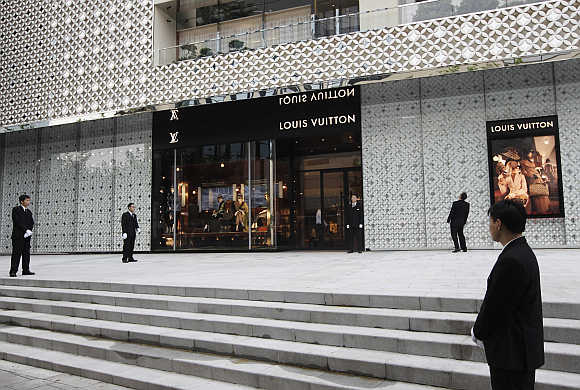Photographs: Christian Hartmann/Reuters Atul Prakash in London
Record prices at art auctions in recent weeks and oversubscribed holidays by private jet are among signals that a stock market slump is approaching, if followers of behavioural finance are to be believed.
They insist social mood governs human action, including investment on stock markets, and their theories are gaining ground as tools for financial analysis. To gauge the mood and the likely impact on markets, behavioural analysts look at traditional measures such as investment polls and options but also at social media, including Twitter and Facebook, and even at developments in art and sport.
The theory goes that people make bad decisions at moments of extreme fear or optimism and that studying their behaviour could provide clues to where equities are headed. Now may be just such a moment.
...
Spending by ultra-rich signals market headed for slump
Image: Visitors walk past impressionist paintings in the State Hermitage Museum in St Petersburg, Russia.Photographs: Alexander Demianchuk/Reuters
"Markets either have topped or will soon top, based on the behaviours I see outside of the markets, especially in art, automobiles and residential real estate," Peter Atwater, president and chief executive of Financial Insyghts, a firm based in Mendenhall, Pennsylvania, that advises on how social mood affects decision making, said.
Atwater cited an Aston Martin car fetching a record $4.85 million at auction in May, a New York sale of Christie's Post-War and Contemporary Art setting 37 records last month, and holiday firm Abercrombie & Kent adding a second departure to its 19-day tour of Africa by private jet after the first sold out.
...
Spending by ultra-rich signals market headed for slump
Image: Private jets on display during the ILA Berlin Air Show in Selchow near Schoenefeld south of Berlin, Germany.Photographs: Tobias Schwarz/Reuters
Behavioural analysts term the 140 per cent rise in major indexes since 2009 the "rich man's rally", and say the behaviour of the uber-rich reflects peak-of-the-market sentiment. Their views are in sharp contrast with many traditional analysts, who bet an improving global economic outlook, along with better company fundamentals, will take indexes to new highs in coming months despite recent "healthy" corrections.
One non-traditional expert who accurately predicted 2007's stocks bust and the recovery in 2009 is Robert Prechter, whose Socionomic Theory of Finance suggests social mood causes economic and political events instead of the other way round.
...
Spending by ultra-rich signals market headed for slump
Image: Aston Martin cars in the production facility in Gaydon, central England.Photographs: Darren Staples/Reuters
"Two dozen stock market sentiment indicators show record or near-record optimism, suggesting the stock market is a lot closer to a top than a bottom," said Prechter, founder of the U.S.-based Socionomics Institute.
To measure mood, Prechter looks at investor polls, buying in stock option contracts and polls of feelings of well-being. "In the past century at least, optimism this extreme has occurred only twice before, in 2000 and 2007," said Prechter, whose theories have influenced many others.
The S&P 500 index slid 50 per cent in two years from August 2000 after the dot-com bubble burst and sank 55 per cent in 17 months from late 2007 as the financial crisis took hold. It surged 33 per cent in a year to hit a record high last month.
...
Spending by ultra-rich signals market headed for slump
Image: Security guards stand in front of the largest Louis Vuitton store in China in Shanghai.Photographs: Aly Song/Reuters
Terry Burnham, author of "Mean Markets and Lizard Brains" and associate professor of finance at Chapman University in Orange, California, is a recent convert. He initially held the traditional notion that economic fundamentals led market moves.
"Twenty five years later, I have come to the opposite view. Prices move first and fundamentals adjust later. My sense is that we are pretty close to a turn in equity markets and people will be given no gentle opportunity to sell stocks," he said.
Experts like Burnham, HSBC's head of technical analysis Murray Gunn and others have been influenced by socionomics, which has gained ground since the 2000 dot-com bust, though some seeing it another tool rather than the only one.
...
Spending by ultra-rich signals market headed for slump
Image: A woman places a watch at a showcase of Pasquale Bruni jeweller at Baselworld fair in Basel, Switzerland.Photographs: Arnd Wiegmann/Reuters
"Prechter's theory is complementary to technical analysis. We incorporate it into our analysis by identifying mood trends," Gunn said. Others base their strategies on these ideas. Richard Peterson, managing partner of behavioural economics consultancy MarketPsych, said he ran his fund on his model for two years during the financial crisis and beat the S&P 500 by 24 percent.
A fund at Derwent Capital, launched by Paul Hawtin in 2011, used only Twitter to take investment decisions and returned 1.9 per cent in its first month as global equity markets sank, but was then forced to close having failed to raise enough capital.
...
Spending by ultra-rich signals market headed for slump
Image: A view shows jewellery and watches displayed in glass cabinets at the shop of Swiss luxury brand Piaget at the Bahnhofstrasse in Zurich, Switzerland.Photographs: Arnd Wiegmann/Reuters
Hawtin, who now uses Twitter analysis as his principal investment strategy to manage private accounts at his new company Cayman Atlantic, said his systems were flagging up an increasing chance of a bubble in the market.
Several top global banks have been less keen to take up the trend, saying it was hard to lay down strict rules on behavioural finance and results were subject to wide interpretations. Some quantitative analysts reject the idea markets are either driven purely by mood or purely by traditional factors, seeing the two in a symbiotic relationship.
...
Spending by ultra-rich signals market headed for slump
Image: People walk past a poster of Swiss watch manufacturer IWC International Watch at the Bahnhofstrasse in Zurich, Switzerland.Photographs: Arnd Wiegmann/Reuters
"I find the term 'socionomics' a bit pompous. However, I subscribe to the idea that social moods may govern events," said Julien Turc, Societe Generale's head of cross-asset quantitative strategy. "I believe both things are the product of each other."
Behavioural finance analysts said although socionomics will continue to gain in popularity, its counter-intuitive nature challenges the way most investors think. "While I expect that it will be a while before investors intuitively think "socionomically", those who do will be at a strong advantage to those who just follow the herd," Atwater said.










article